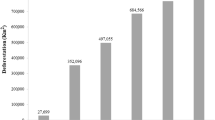Abstract
Foresters often claim that the goal of good forest policy is to have a sustained forest yield, or even a maximum sustainable yield. They also claim that people wish to save a few extra trees for their children. This bequest motive is not modelled in the standard approach to the optimal rotation problem. In this paper, we present a standard version of an overlapping generation model augmented with a simple tree technology. We show in particular that the market equilibrium can be dynamically inefficient, and that a bequest motive in terms of trees can correct for the overaccumulation of capital that causes the inefficiency. The bequest motive also enables us to account for a harvesting intensity varying with age (young people typically cut more than elderly people) in spite of a perfect capital market.
The crux of the argument is that a bequest motive is likely to increase the equilibrium interest rate and move the economy away from a maximum sustainable yield policy. It, however, improves efficiency and is able to explain empirical regularities that are not easily explained by a traditional perfect capital market approach to forestry.
Similar content being viewed by others
References
Allais, M. (1947), Economie et intérêt, Paris: Imprimerie Nationale.
Balasko, Y., Cass, D., and Shell, K. (1980), ‘Existence of Competitive Equilibrium in a General Overlapping-Generation Model’, Journal of Economic Theory, 23, 307–322.
Blanchard, O. (1985), ‘Debt, Deficit, and Finite Horizons’, Journal of Political Economy 93, 223–247.
Blanchard, O. and Fischer, S. (1989), Lectures on Macroeconomics, Cambridge, MIT-Press.
Binkeley, C. (1981), Timber Supply from Private Foresters, Bulletin No. 92, Yale University: School of Forestry and Environmental Studies, New Haven.
Cass, D. C. (1972), ‘On Capital Overaccumulation in the Aggregate Neoclassical Model of Economic Growth: A Complete Characterization’, Journal of Economic Theory 4, 200–223.
Carlén, O. and Löfgren, K. G. (1986), ‘Supply Consequences of Subsidizing Thinning Activities in Sweden’, Scandinavian Journal of Forest Research 1, 379–386.
Diamond, P. (1965), ‘National Debt in a Neoclassical Growth Model’, American Economic Review 55, 1126–1150.
Grandmont, J. P. (1985), ‘On Endogenous Business Cycles’, Econometrica 53, 995–1045.
Johansson, P. O. and Löfgren, K. G. (1985), The Economics of Forestry and Natural Resources, Oxford: Basil Blackwell.
Kemp, M. C. and Long, N. V. (1980), ‘The Underexploitation of Natural Resources: A Model with Overlapping Generations’, in: M. C. Kemp and N. V. Long (eds.) Exhaustible Resources, Optimality and Trade, North-Holland.
Kuuluvainen, J. (1989), Nonindustrial Private Timber Supply and Credit Rationing: Microeconomic Foundations with Empirical Evidence from the Finish Case. Report 85, Swedish University of Agricultural Sciences, Department of Forest Economics.
Mäler, K. G. (1989), Sustainable Development, The Stockholm School of Economics, mimeographed.
Samuelson, P. A. (1958), ‘An Exact Consumption — Loan Model of Interest Rate with or without the Social Contrivance of Money’, Journal of Political Economy 66, 467–482.
Samuelson, P. A. (1976), ‘Economics of Forestry in an Evolving Society’, Economic Inquiry 12, 466–492.
Author information
Authors and Affiliations
Additional information
The author acknowledges comments from Karl-Göran Mäler, Stockholm School of Economics, participants in the economics-forestry economics seminar at the University of Umeå, and two anonymous referees.
Rights and permissions
About this article
Cite this article
Löfgren, KG. Another reconciliation between economists and forestry experts: OLG-arguments. Environmental and Resource Economics 1, 83–95 (1991). https://doi.org/10.1007/BF00305952
Issue Date:
DOI: https://doi.org/10.1007/BF00305952




